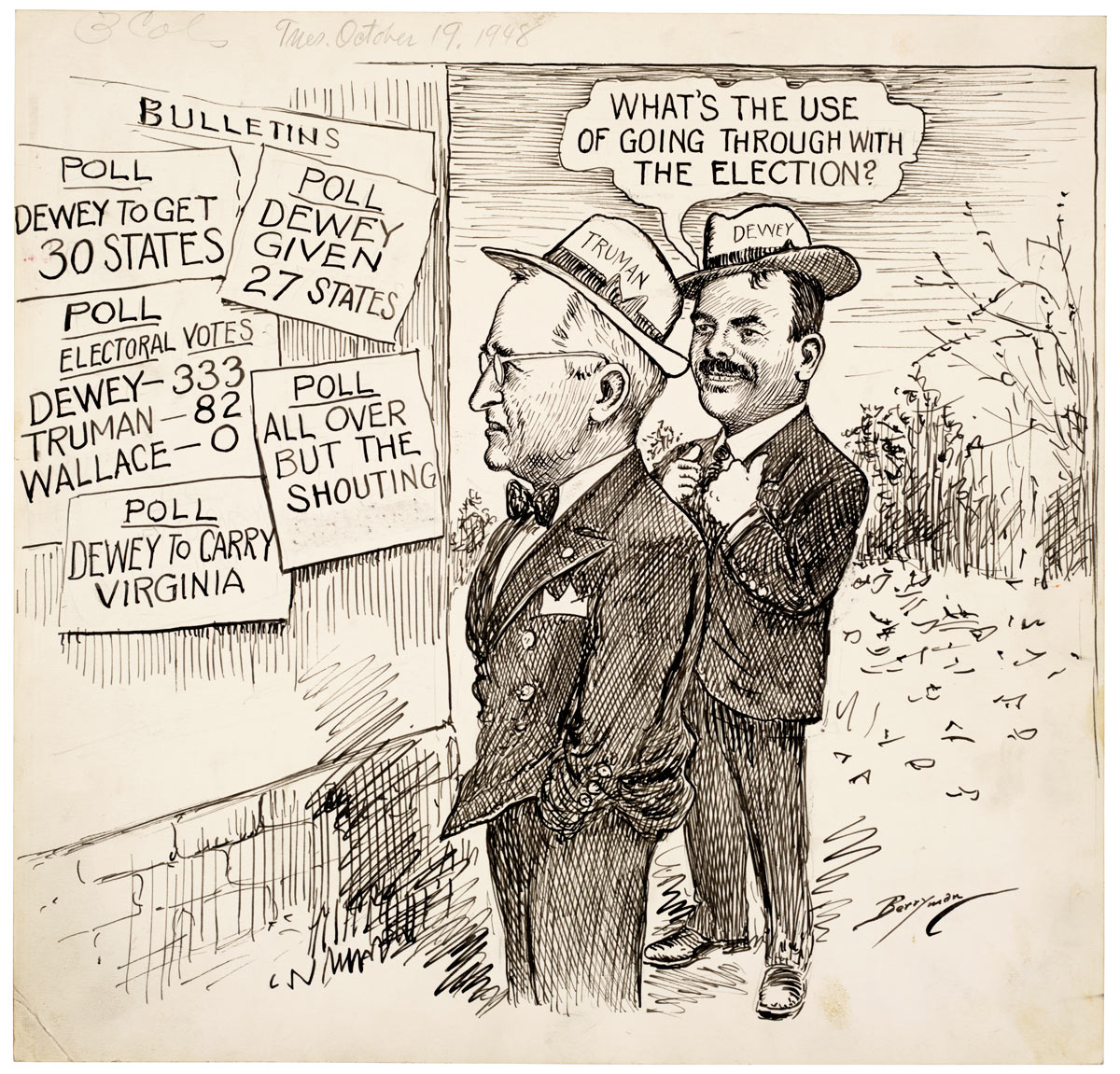
For the most part, I’m going to use the commonplaces lens during my speech. Generally, political cartoons appeal to commonplaces in order to relate to their audience (and thus become more effective), and this cartoon is no exception. A lot of commonplaces could be talked about in a speech about this cartoon. In the interest of brevity, I plan on talking about two: the commonplace related to ‘expert opinion’ and the commonplace related to voter apathy in America.
In my discussion about the first commonplace, I want to talk about how vague the term ‘expert’ is. At times, it seems that any person will cite someone as an expert if they present any sort of data, no matter how error ridden or flawed it is. So, I’ll also highlight how the term is a bit corrupted, as people try to cite different ‘experts” opinions as fact, when they have no right to do that in the first place. This is as relevant today as it was in 1948.
(Quick Side note: Why am I equating the pollster’s to experts? Because the political cartoon is citing their data, and claiming that their data is a fact, evidenced by the fact that Dewey is suggesting the election is already won. So the cartoon is citing the pollsters as experts in order to try to give their claim of Dewey’s projected victory as fact).
In my discussion about the second commonplace about voter apathy, I’ll highlight how the cartoon makes it seem as though the election is already won. I already touched on this in the expert opinion section, but it clearly tries to use evidence to suggest that Dewey will win the election. Dewey’s speech bubble further discourages people from voting by saying the election is as good as won. Thus, the implicit message of the cartoon is that your vote won’t matter because the election is already won. Because voter apathy was already a common belief among voters, this cartoon reinforces this commonplace in an implicit or explicit attempt to discourage people from voting, specifically Truman voters.
I may also touch on the lens of rhetorical situation in the sense that this political cartoon utilizes exigence of the situation to maximize its rhetorical affect (i.e. it was printed before the election, but close enough to the election date that it looked as though Truman’s odds were insurmountable).
Of course, I’ll relate these commonplaces back to civic life today, urging people to vote and carefully consider the information provided to them by ‘experts.’
Hi Matt! I think that the commonplaces lens was probably going to be the most effective choice for the artifact that you chose. Your artifact is definitely referencing many of the commonplaces of not just the election then, but of many voters today. Many believe their vote doesn’t matter, but that shouldn’t be the case, it is our civic duty to vote. I am interested to see how you approach the commonplace regarding the experts, considering the way they are perceived in the modern world. It is often difficult to determine who is a true expert, and who are the people who merely recycle information fed to them. I also see where you can use the rhetorical situation lens, there was definitely a kairotic moment when this cartoon was released, and the cartoonist is likely aware of the audience and their reluctance to vote.
Hi Matt, both of your choices for commonplaces seem well-developed. In regards to your “side-note,” you should definitely make sure to include in your speech why you are considering the pollsters experts. It makes sense once it’s explained, but if you don’t at least mention your reasoning in the speech, it might become hard to follow. I like your idea of also including a lens of rhetorical situation, since the cartoon was very relevant to events at the time of publishing. Overall, you seem to have a good plan for your speech!
Hi Matt,
Well done on your elevator pitch last week. Onto this post, I think it is a great idea for your commonplace lens. It is a very good point that you bring up with who exactly we as the public consider experts. Often the public tends to hear that term and chooses to believe it, but who exactly are they listening to. Overall it seems as though you know which directions you will be heading in. Best of luck with your further development.